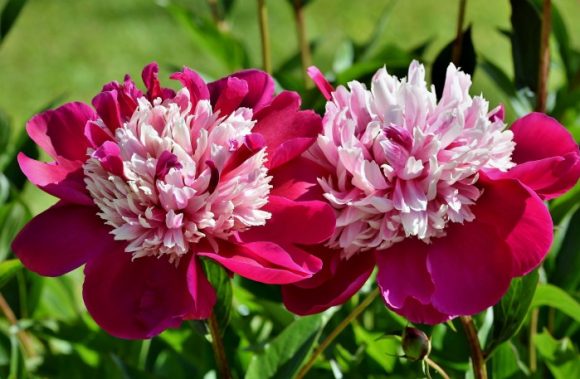- The Miraculous Shiny Bush Plant - January 18, 2021
- Colorful, Edible and Medicinal Celosia - January 10, 2021
- Radish, a Nutritional Power House - December 19, 2020
The peony, also known as paeony is a perennial flowering plant with a thick, knobby rootstock. It has a green, juicy stem and grows to about 3 feet high. Peonies have ternate or biternate leaves and bring forth purple-red, pink, off-white or red, large, solitary flowers that look similar to roses. Normally, peonies bloom from May to August. Among beneficial plants, it has the longest history of any flowering herb used for medicinal and aesthetic purposes.
Ancient records show that peonies are among the oldest of all cultivated flowers.
The flowers are big, bold, yet delicate and full of flavor. They are great for cut-flower arrangements and are Britain’s favorite flowers.
Peonies are fondly referred to as super flowers for their ability to awe people with their beauty while at the same time helping to ease various medical problems. Curiously, the flowers are named after the Greek god, Paen, who was the god of healing.
Peonies health benefits include:
Anti-inflammation
All peony species have high amounts of anti-inflammatory glucosides. Paeoniflorin is the major component largely responsible for the plant’s medicinal actions though other compounds probably play a role.
Peonies are known for their ability to heal inflammation problems. One particular variety known as paeonia lactiflora has been used in Chinese traditional medicine for years to treat muscle cramps, rheumatoid arthritis, dysmenorrhea, hepatitis, fever, and systemic lupus erythematosus.
Peonies’ medical claims are no fairy tales. Recent studies seeking to look into the anti-inflammatory abilities of paeonia lactiflora discovered that it has compounds that restrain the production of a hormone known as prostaglandin E2, which is known to cause fever. Peonies are also known to assist cell interaction by inhibiting the increase of intracellular calcium ion concentration.
Hepatoprotective
Peonies are known to have hepatoprotective effects which are effective for reducing toxicity and bilirubin levels. As a result, peony extracts are used to boost liver health and treat viral hepatitis.
Immune boosting
Glucosides and paeoniflorin help in reducing pro-inflammatory cytokine levels. Cytokines are small proteins that regulate inflammatory and immunology responses. These are what are responsible for managing arthritis and other health chronic conditions. However, there are bad cytokines known as pro-inflammatory cytokines. These bad cytokines are responsible for causing conditions such as asthma and Crohn’s disease.
Brain health
Peony has neuroprotective and sedatives capabilities which have been shown to improve cognition, improve brain function and manage mood disorders including anxiety and depression. Science has not yet managed to give a clear explanation of how these compounds work to protect the brain. However, some schools of thought hold that peony’s glucosides inhibit monoamine oxidase (MAO), an enzyme that inhibits certain neurotransmitters which are thought to contribute to the development of degenerative conditions.
Now, next time you catch a whiff of peonies in bloom and admire their beautiful blossoms, show some respect for this multi-purpose flowering plant which has withstood the test of time.





